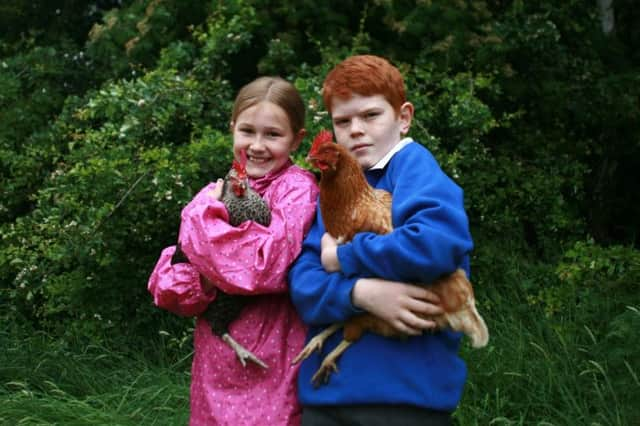School’s chickens prove to be a big hit


The pupils at this village school near Huddersfield are reaping the rewards of a drive towards outdoor education, initiated by recently retired teacher Linda Green. Over the past five years the school has transformed its grounds to include an allotment, a greenhouse, seven raised gardens - one for each class - and a chicken run.
Headteacher Debra Knowles said: “One of our curriculum drivers is outdoor learning. The children have been helping us to develop the outdoor environment. It’s part of their Spiritual Moral Social Cultural education. The idea was it was about caring for something, taking responsibility, but for a lot of our kids it’s been awe and wonder.”
Advertisement
Hide AdAdvertisement
Hide AdAs well as learning more about where the food they eat come from, pupils use food production to learn about everything from mathematics and budgeting skills to literacy.
They weigh produce for sale and use the money they make to buy seeds, chicken feed and straw for bedding. Their fundraising efforts have been complimented by the Morrisons ‘Let’s Grow’ scheme, which has provided class sets of children’s size equipment including gloves, trowels, hoes and secateurs.
The vegetable beds have done well so far, producing potatoes, carrots, onions, leeks, pumpkins and more. The children have also planted fruit trees, raspberries and strawberries.
Where possible, the produce they grow is used in the school kitchens.
Advertisement
Hide AdAdvertisement
Hide Ad“One day everything on the plate was from the garden bar the meat,” said Mrs Green.
Leftover school dinners are fed to the chickens where appropriate, and chicken manure helps speed up the processes in the school’s compost heaps.
The gardens have also fed into the school’s literacy programme, with a group of budding journalists producing a blog which documents the chickens’ adventures.
“It’s such an entertaining and well-written blog that it’s become famous,” said Mrs Knowles. “When you say you work here people say, ‘oh yes, the chicken blog’.”
Advertisement
Hide AdAdvertisement
Hide AdThe journalism club encourages the children to write about anything that inspires them. There has been lots to report, including the tale of Gingernut the runaway chicken, who sadly is still missing, and a dramatic attack by a fox, which killed some of the birds.
Originally there were seven chickens, with each class naming one and taking responsibility for its welfare.
Nine-year-olds Ellie, Isabella and James are in charge of the rotas that ensure the chickens are happy and healthy every day, and do a lot of the hands on husbandry.
They feed them, check if there are any eggs, clean out the hen house and let the chickens out in the morning and back in at the end of the day.
Advertisement
Hide AdAdvertisement
Hide AdParents and children queue up to look after the chickens during the holidays. In fact the whole outdoor learning environment has galvanised the school community. Each element of the school garden was created from scratch, with the children and their families helping at every stage.
Teams of up to 20 parents barrowed four tonnes of soil from the car park to the site to help create the allotments. They were there again to offer a helping hand during the erection of the greenhouse, the creation of the compost bins and the building of the chicken huts.
The children have got stuck in too, and were entirely responsible for digging their class gardens.
Mrs Green said: “A lot of things children access these days are instant. They need to learn that things need nurturing and looking after. If we give them a pumpkin seed to grow, the reward comes months later, but they can get real satisfaction from it.”